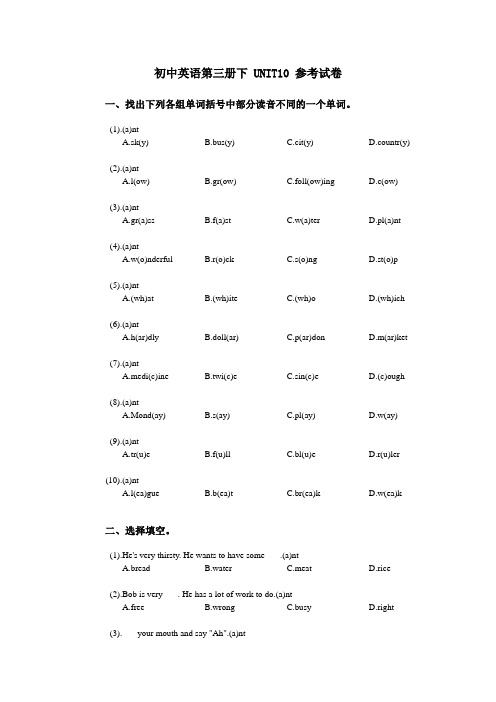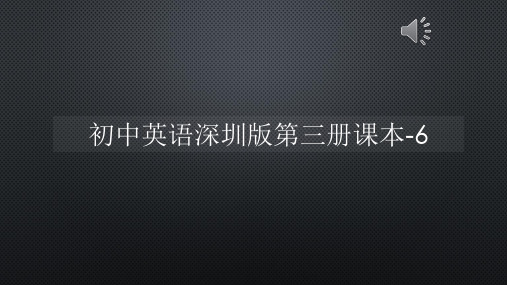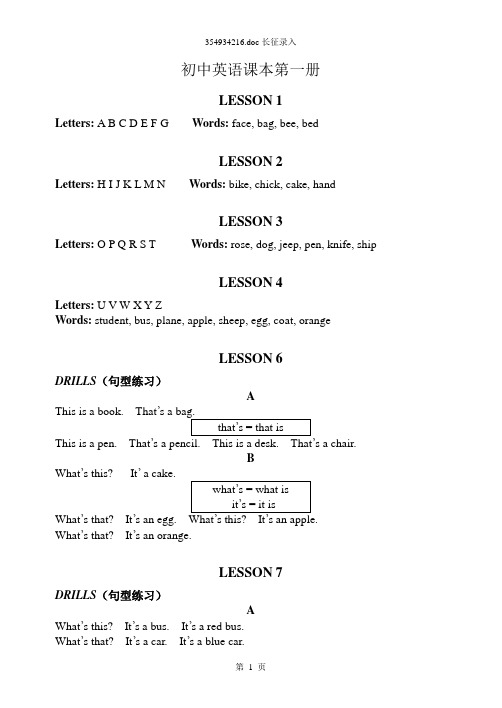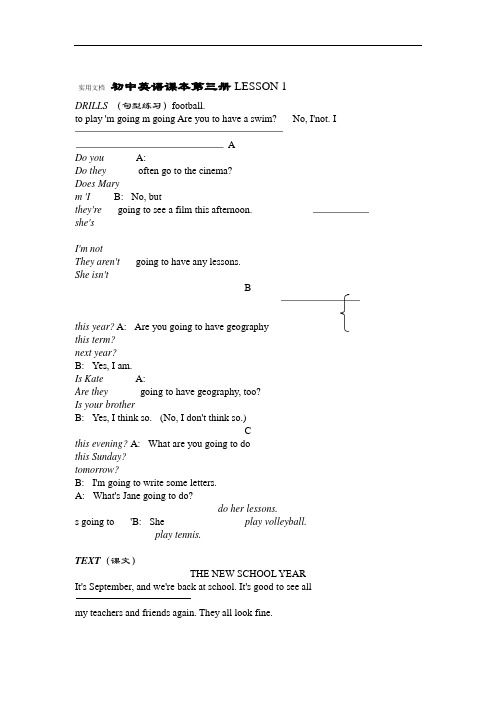年代80初中英语第三册
初中英语第三册词汇

初中英语第三册词汇一、名词1.accident 意外,事故2.advertisement (=ad ) 广告3.address 地址4.adult 成年人5.advice 忠告,建议6.air (不可数)空气7.alien 外星人8.article 文章9.artist 画家,艺术家10.a kind of …一种11.a.m 上午p.m 下午12.athlete 田径运动员13.headache 头痛backache 背痛stomachache 肚痛14.balloon 汽球15.bamboo 竹16.band 乐队17.baseball 棒球18.basket 篮子19.bath 洗澡20.battle 战斗21.beach 海滩,22.bear熊23.beauty 美24.beef 牛肉pork 猪肉25.bicycle 自行车26.birth 出生27.a bit / a little bit 一点28.body 身体,躯体,尸体29.bone 骨头30.break 休息31.business 生意;事业;职责32.butterfly 蝴蝶33.button 纽扣,按钮34.mutton 羊肉35.cabbage 大白菜36.Canada 加拿大Canadian 加拿大人;加拿大的37.cancer 癌症38.candy 糖果39.capital 首都;省会40.cause 起因41.century 世纪42.chance (可数)机会43.Chinese medicine 中药44.chips 片;薯片45.chocolate 巧古力46.cloud 云47.club 俱乐部48.coffee 咖啡49.coin 硬币50.cold pill 感冒药片51.college 大学,大专院校petition 竞争,竞赛53.concert 音乐会54.congratulation 恭贺55.country(side) 乡村56.court 球场;法院57.daily日报58.dancer 舞者59.dentist 牙医60.diary 日记61.dictionary 字典,词典62.director 导演;主任63.disease (可数)疾病64.dish 碟;菜肴,菜式65.doctor 医生;博士(=Dr.)66.drawing 画作67.drum 鼓68.duck 鸭69.dustbin 垃圾箱70.duty 职责71.earth 地球;泥土72.eggplant 大象73.Egypt 埃及74.e-mail 电子邮件75.emperor 皇帝76.environment 环境77.exam (= examination)考试78.example 例子,事例,范例,模范79.exercise 练习题80.exhibition 展览81.fact 事实82.factory 工厂83.favor 帮助,恩惠84.fever 发烧85.first aid 急救86.flu 流感bird flu 禽流感87.forest 森林88.form表格89.fox 狐狸90.France 法国91.friendship 友谊92.frog 青蛙93.fruit 水果94.fur 毛皮95.germ 细菌96.goal 进球,得分;目标97.gold 黄金98.goose (复数geese )ernment 政府100.grandmother (grandma)(granny )祖母,外祖母(奶奶,外婆)101.grandfather (grandpa)祖父,外祖父(爷爷,外公)102.grass 草地103.Greece 希腊104.habit (可数)习惯105.hobby (可数)业余爱好106.happiness幸福;喜庆;喜事107.health 健康108.heart 心,心脏109.height 高度(high高的)110.weight 重量(weigh…重达…)111.hen 母鸡112.cock 公鸡113.chick 小鸡114.chicken 鸡(总称)115.hole 洞、孔116.hometown 家乡117.homeland 祖国(= motherland )118.Hong Kong 香港119.honor 荣誉120.horse 马121.host 主人122.hour 小时123.Houston Rocket 休斯敦火箭队124.human 人类125.ice (不可数)冰126.ice cream 冰淇淋127.illness 病rmation (不可数)信息,资料129.insect 昆虫130.instrument 乐器,仪器,器械131.Internet 因特网132.Ireland 爱尔兰133.jazz 爵士乐134.job (可数) 工作work (不可数)工作135.journalist 新闻记者136.joy 欢乐137.kilogram (=kg) 千克(公斤)138.kilometer (=km)千米(公里)139.knowledge (不可数)知识,学问;知晓140.river 江、河ke 湖泊142.sea 海143.ocean 洋nd 陆地nguage (可数)语言146.lift 电梯147.litter垃圾,废物148.letter 信件149.living 生计150.lots of …/ a lot of …很多(可跟可数或不可数名词)151.lung 肺heart 心脏brain 大脑stomach 胃152.machine 机器153.meal (可数)饭,餐154.meaning 意思,意义,含义155.medal 奖牌model 模特,模型,范例middle 中间的156.medicine (不可数)药157.member 成员158.message (可数)音信,口信,短信,消息e 英里lion 百万161.billion 十亿162.minute 分钟163.motto 格言164.mountain 大山,山脉165.MTV (music television)音乐电视166.musician 乐手,音乐人,音乐家167.nation 国家,民族168.nationality 国籍169.nature 自然,自然界;性质 网171.No. (= Number.) 第…号172.novel (长编)小说story (短编)小说173.object 物体;宾语174.occupation 职业175.page 页;第几页176.pain (不可数)痛苦177.painting (油、水彩)画作178.palace 宫殿179.place地方180.Paris 巴黎181.patient 病人182.planet 星球183.plant 植物184.plate 碟,盘185.player 球员,选手186.plenty of …大量的187.pond 池塘188.potato 马铃薯,土豆189.potato chips 薯条190.power 力量;能量;权力;电力191.price (不可数)价格,价钱192.king 国王193.queen 王后;皇后194.question (可数)问题195.radio 无线电,收音机196.railway 铁路197.record 记录,唱片198.report 报道,报告199.reporter新闻通讯员,记者200.republic 共和国201.enrich 丰富202.robot 机器人203.roller skating 滑旱冰skating 滑冰; skiing 滑雪204.row 排,行205.rock 岩石206.rock and roll 摇滚乐207.rubber 橡胶;橡皮208.runner 跑步者,赛跑者209.Russia 俄罗斯210.sandwich 三明治(面包)211.SARS 非典型性肺炎212.sausage腊肠,香肠213.scenery 风景,景色214.scientist 科学家215.score 得分,分数216.secret 秘密217.section 部分;部门218.sentence句子219.shame 憾事,羞愧,惭愧220.sheep (复数sheep)221.shower淋浴( take a shower 洗一个淋浴)( take a bath 洗个澡)222.situation 情况,情形;形势223.skin 皮肤224.snake 蛇225.stone 石头226.strawberry 草莓227.surface 表面228.symbol 标志,符号二、动词及短语1.act 表演;行动2.advise 劝告,忠告3.afford 负担,支付,买得起,支付得起4.agree 同意,赞成5.answer 回答6.appear 出现7.arrive( at / in …)到达8.avoid 避免9.become 成为;变得10.begin with …以…开始11.bear 忍受,容忍12.boil 煮沸boiled water (凉)开水boiling water (热)开水13.break 打破;违反14.…break out (战争,灾情,疫情等)发生15.brush 刷去16.build up oneself 增强某人体质17.call for …寻求;号召,倡议18.care 介意,在乎;关心19.care for …照顾;喜欢20.cause 促使,引起,导致21.chat 聊天22.check over …. 给…作体检23.cheer 欢呼,喝彩24.cheer … on …为…加油/喝彩25.choose 选择26.collect 收集27.continue 继续28.control 控制,操控29.cover 掩盖,覆盖30.cycle 骑(车)31.die 死亡32.dig 挖,掘33.do exercise / do sports 锻炼;做运动34.do one’s best / try one’s best 尽力do / try one’s best to do sth .尽力做某事35.download 下载36.dream 梦想37.drop 掉下来,滴下38.encourage 鼓励39.examine 检查40.fall ill / be ill 生病41.have a fever 发烧42.do someone a favor 帮助某人(= help someone)43.feed 喂,喂养44.feed on …(动物)以…为食,以…为生45.feel 感觉,觉得46.feel like doing sth 想做某事47.fight 战斗,打架48.fill 充满,填满49.fill.. with …用…充满…50.finish 完成51.form 形成,组成。
初中英语第三册下期UNIT8参考试卷

初中英语第三册下 UNIT8 参考试卷一、找出下列各组单词括号中部分读音不同的一个单词。
(1). (a)ntA.(th)inkB.mou(th)C.(th)ousandD.whe(th)er(2). (a)ntA.dan(c)eB.(c)ommonC.(c)atchD.(c)ost(3). (a)ntA.m(a)tchB.pl(a)ntC.gl(a)ssD.f(a)ther(4). (a)ntA.tr(ou)bleB.y(ou)ngC.en(ou)ghD.m(ou)ntain(5). (a)ntA.wh(i)leB.t(i)llC.sm(i)leD.kn(i)fe(6). (a)ntA.res(u)ltB.br(u)shC.min(u)teD.j(u)st(7). (a)ntA.s(e)llB.m(e)mberC.(e)veningD.dr(e)ss(8). (a)ntA.m(o)dernB.d(o)llarC.sh(o)pD.c(o)me(9). (a)ntA.b(a)llB.w(a)llC.sh(a)llD.s(a)lt(10). (a)ntA.(ch)airB.lun(ch)C.heada(ch)eD.tea(ch)er二、根据句子意思,用适当的词填空。
(1).A: What's ___ with you, Kate?B: I've got a bad headache.(2).Tom's trouble is very common these days. He'll ___ well soon.(3).Come along. I'll ___ you my new skirt, I like it very much.(4).Sam cut his finger so badly that he had to see the ___.(5).Mr Know-all knows ___ to do maths problems.三、选择填空。
初中英语第三册下期UNIT10参考试卷

初中英语第三册下 UNIT10 参考试卷一、找出下列各组单词括号中部分读音不同的一个单词。
(1). (a)ntA.sk(y)B.bus(y)C.cit(y)D.countr(y)(2). (a)ntA.l(ow)B.gr(ow)C.foll(ow)ingD.c(ow)(3). (a)ntA.gr(a)ssB.f(a)stC.w(a)terD.pl(a)nt(4). (a)ntA.w(o)nderfulB.r(o)ckC.s(o)ngD.st(o)p(5). (a)ntA.(wh)atB.(wh)iteC.(wh)oD.(wh)ich(6). (a)ntA.h(ar)dlyB.doll(ar)C.p(ar)donD.m(ar)ket(7). (a)ntA.medi(c)ineB.twi(c)eC.sin(c)eD.(c)ough(8). (a)ntA.Mond(ay)B.s(ay)C.pl(ay)D.w(ay)(9). (a)ntA.tr(u)eB.f(u)llC.bl(u)eD.r(u)ler(10). (a)ntA.l(ea)gueB.b(ea)tC.br(ea)kD.w(ea)k二、选择填空。
(1). He's very thirsty. He wants to have some ___.(a)ntA.breadB.waterC.meatD.rice(2). Bob is very ___. He has a lot of work to do.(a)ntA.freeB.wrongC.busyD.right(3). ___ your mouth and say "Ah".(a)ntA.CloseB.LeaveC.TurnD.Open(4). John is studying in the No.14 Middle School. He is a ___.(a)ntA.studentB.farmerC.soldierD.doctor(5). This jacket is ___ of cotton.(a)ntA.madeedC.doneD.produced三、根据句子意思,用适当的词填空。
初中英语深圳版第三册课本-6【声音字幕同步PPT】

"You cut yourself badly," he said. "It's a deep cut
It's bleeding a lot. I'll clean it and put a bandage on." He washed and bandaged Ken's foot.
You can teach yourself. Words and expressions
himself 他自己
sandal
凉鞋
bare 赤裸
bare foot 赤脚
lift up 举起
nasty 讨厌的
a nasty cut
严重的
first-aid \.急救的
post 岗位;所
the first-aid post 急救站
nT-shirt T恤衫 jeans 牛仔裤
note\
纸币;笔记 arrive 到达
hold sb.by the arm 抓住某人的胳膊
arrest 拘留
yet 尚且;仍然
report
报告chieຫໍສະໝຸດ 首领get back 取回
imagine 想象
retell 复述
retold\
[retell]过去分词 woolen\ 毛织的
"He cut himself on a piece of glass,"Anne said.
"He stepped on a broken bottle,"Sue added.
年代80初中英语第一册

初中英语课本第一册LESSON 1Letters: A B C D E F G Words: face, bag, bee, bedLESSON 2Letters: H I J K L M N Words: bike, chick, cake, handLESSON 3Letters: O P Q R S T Words: rose, dog, jeep, pen, knife, shipLESSON 4Letters: U V W X Y ZWords: student, bus, plane, apple, sheep, egg, coat, orangeLESSON 6DRILLS(句型练习)AThis is a book. That’s a bag.that’s = that isThis is a pen. That’s a pencil. This is a desk. That’s a chair.BWhat’s this? It’ a cake.what’s = what isit’s = it isWhat’s that? It’s an egg. What’s this? It’s an apple.What’s that? It’s an orange.LESSON 7DRILLS(句型练习)AWhat’s this? It’s a bus. It’s a red bus.What’s that? It’s a car. It’s a blue car.BIs this a jeep? Yes, it is. Is it green? Yes, it is.CIs this a ship? Yes, it is. What colour is it? It’s yellow.Is that a plane? Yes, it is. What colour is it? It’s white.DIALOGUE(对话)A:What colour is this apple?B:It’s red.A:What colour is that banana?B:It’s yellow.A:What colour is an orange?B:Why, it’s orange. An orange is orangeLESSON 8DRILLS(句型练习)AThis is my cup. It isn’t your cup. My cup is white. Your cup is yellow. That isn’t his bike. It’s her bike. His bike is black. Her bike is green.isn’t = is notBIs this your desk? Yes, it is. Is that your chair? No, it isn’t. It’s his chair. Is this your rubber? Yes, it is. Is that your ruler? No, it isn’t. It’s her ruler. DIALOGUE(对话)Tom:Kate!Kate:Yes?Tom:Is this your knife?Kate:No, it isn’t.* * *Kate:Tom! Is this your pencil-box?Tom:Yes, it is. Thank you.Kate:That’s all right.LESSON 9DRILLS(句型练习)Aone ship; two ships; three cakes; four coats; five beds;six bees; seven bananas; eight oranges; nine buses; ten boxes;BThese are apples. Those aren’t apples. They’re oranges.The apples are here. The oranges are there.aren’t = are notthey’re = they areThese are desks. Those aren’t desks. They’re tables.The desks are here. The tables are there.DIALOGUE(对话)A:Look,what’s this?B:It’s a ship.A:No,it’s a sheep. These are all sheep. They’re white sheep. What are those? B:Why, they’re sheep, too. They’re black sheep.A:No, they aren’t sheep. They’re goats.GRAMMAR(语法)名词的复数形式(The Plural Number of Nouns)(Ⅰ)1、一般在单数名词末尾加-s:book-----books ruler-----rulers egg-----eggs student-----students hand-----hands rose-----roses orange-----oranges2、以s、x等结尾的词加-es:bus-----buses box-----boxes注:knife的复数形式为knives,sheep的复数形式和单数形式相同。
新课标初中英语第三册词汇(外研社初中起点)

ticket=n.票,入场券
Oscar=n.奥斯卡金像奖
Module 7=模块7
past=adj.过去的,以前的
activity=n.活动
do=v.(过去式did)做
have=v.(过去式had)有
go=v.(过去式went)去,前往
kind=n.种类
millon=n.百万
exciting=adj.使人激动的,令人兴奋的
northeast=n.东北,东北方
square=n.平方
kilometre=n.公里
statue=n.雕像,塑像
liberty=n.自由
Statue of Liberty=自由女神像(位于美国纽约)
gift=n.礼品,赠品
Italian=adj.n.意大利人的,意大利的,意大利人(语)
Italy=n.意大利
Japanese=n.adj.日本人(语),日本人的,日本的
Indian=adj.n.印度的,印度人,印度语
Module 2=模块2
national=adj.国家的,民族的
holiday=n.假日,假期
football match=n.足球比赛
noise=n.噪音,噪声
last=v.维持,持续
result=n.结果,分数
mark=v.打分数
post=n.邮件,邮政
library=n.图书馆
computer game=电脑游戏
information=n.信息,资料
site=n.站点
buy=v.(过去式bought)购买
save=v.节省
年代80初中英语第三册

实用文档初中英语课本第三册LESSON 1DRILLS(句型练习)football.to play 'm going m going Are you to have a swim? No, I'not. IADo you A:Do they often go to the cinema?Does Marym 'I B: No, butthey're going to see a film this afternoon.she'sI'm notThey aren't going to have any lessons.She isn'tBthis year? A: Are you going to have geographythis term?next year?B: Yes, I am.Is Kate A:Are they going to have geography, too?Is your brotherB: Yes, I think so. (No, I don't think so.)Cthis evening? A: What are you going to dothis Sunday?tomorrow?B: I'm going to write some letters.A: What's Jane going to do?do her lessons.s going to 'B: She play volleyball.play tennis.TEXT(课文)THE NEW SCHOOL YEARIt's September, and we're back at school. It's good to see allmy teachers and friends again. They all look fine.实用文档new going to have a in Grade Two this year. We're We'rem going to work hard 't easy. I'subject-physics. I hear physics isns going to 'm not very good at maths, but Wei Fang says she'at it. Ihelp me. I think I can do better than last year.'I like English very much. I always work hard at it. This year I needs but he speaking. Zhang Hong likes English too, m going to do morem going to help him.help. I'classmates My to work for the wall-newspaper. This term I'm goings interesting work, 'say I draw well, and my handwriting is good. Itand I like it.m going to do my best this year. I'GRAMMAR(语法)Be going to 结构,打算(做什么)或将要“Be going to + 动词原形”表示就要(即将)等发生的事。
英语课文1

IT‘S UNFAIRJenny was a good girl, but she had one shortcoming. She was often late for school. One morning when she ca me in late, Mr Black, her teacher, got angry."I‘ll write to your father if you aren‘t here on time tomorrow," he told her. Jenny didn‘t want him to do that because her parents were very strict with her.The next day she got up very early and went to scho ol without breakfast. When the bell rang, she was waiti ng in her seat. The door opened and the teacher came in. But it wasn‘t Mr Blac k. It was Miss Green. Mr Black w as ill, so she was taking his class instead. How disapp ointed Jenny was!The next morning Jenny got up even earlier. After a quick breakfast she hurried to school. Just before she got to the school gate, she stopped. There was a walle t lying on the ground.She picked it up. "Whose is this?" She wondered.As she stood there, she heard the first bell. "What shall I do?" She asked herself. "I‘ll turn it in firs t," she decided. And so she did.When she hurried into the classroom, Mr Black was already beginning his lesson."Jenny White," he said as soon as he saw her. "Didn ‘t I tell you to be here on time?""I‘m sorry, sir," Jenny tried to explain. "I was l ate because I had to….""I will not to listen to any excuse," Mr Black stop ped her. "If you can‘t get here on time, I will have t o write to your father.""But Mr Black, that‘s…that‘s unfair!""Unfair! How dare you say that?" Mr Black said angr ily. "I‘ll report you to the headmaster!""I was trying to do a good deed," Jenny thought, "a nd now…" she couldn‘t keep back her tears.As soon as the bell rang for the break, the door op ened and in came Mr Smith, the headmaster. He was holdi ng a wallet in his hand. "Excuse me, Mr Black," he said, "but is this wallet yours?""Why, yes. It is mine." Mr Black was surprised. "I didn‘t know I lost it.""One of our girl found it and turn it in just befor e school started," Mr Smith said."Oh? Who was it?" Mr Black asked. "I must thank her.""It was Jenny White."Mr Bla ck‘s face slowly turned red. He looked at Je nny and said, "I‘m very sorry, Jenny. I take back what I said.""And I‘m sorry, Mr Black. I‘ll try not to be late again," Jenny said.这是1983年10月第一版初中英语第四册第4课和第5课《这是不公平的》。
- 1、下载文档前请自行甄别文档内容的完整性,平台不提供额外的编辑、内容补充、找答案等附加服务。
- 2、"仅部分预览"的文档,不可在线预览部分如存在完整性等问题,可反馈申请退款(可完整预览的文档不适用该条件!)。
- 3、如文档侵犯您的权益,请联系客服反馈,我们会尽快为您处理(人工客服工作时间:9:00-18:30)。
初中英语课本第三册LESSON 1DRILLS (句型练习)Are you going to have a swim? No, I'm not. I'm going to play football.AA: Do youDo they _ often go to the cinema?Does MaryB: No, but r I'm [.they're . going to see a film this afternoon.[she's II m not [They arent . going to have any lessons.She isnt IBA: Are you going to have geography this year?.this term?next year?B: Yes, I am.A: Is Kate -Are they a going to have geography, too?Is your brother /B: Yes, I think so. (No, I don't think so.)CA: What are you going to do - this evening?-this Sunday?tomorrow?B: I 'm going to write some letters.A: What s Jane going to do?B: She's going to do her lessons.- play volleyball.play tennis.TEXT (课文)THE NEW SCHOOL YEARIt's September, and we're back at school. It 's good to see all my teachers and friends again. They all look fine.We're in Grade Two this year. We 're going to have a new subject-physics.I hear physics isn 't easy. I m going to work hard at it. I m not very good at maths, but Wei Fang says she 's going to help me. I think I can do better than last year.I like English very much. I always work hard at it. This year I m going to do more speaking. Zhang Hong likes English too, but he needs help. I m going to help him.This term I m going to work for the wall-newspaper. My classmates say I draw well, and my handwriting is good. It 's interesting work, and I like it.I m going to do my best this year.GRAMMAR (语法)Be going to 结构“Be going to +动词原形”表示就要(即将),打算(做什么)或将要发生的事。
常与tomorrow, tomorrow afternoon, next week, this year等表示将来的时间状语连用。
如:We're going to have a new subject this year.Is Li Ping going to play basket-ball with us?What are you going to do next Sunday?It's going to rain this afternoon.LESSON 2DRILLS (句型练习)What's John going to do? He's going to skate.Where's he going to skate? In the park.AA: What are you doing over there?Are you r drawing a picture?< doing your homework?一writing a letter to Grandpa?B: No. I m reading the newspaper.A: When are you going to r draw the picture [ then?J do your homework a[ write the letter ,B: This evening.What are they going to do C the day after tomorrow? J this Sunday morning?-next Saturday afternoon? They're going to have a volleyball match. Where are they going to have it?They are going to have it 「on the playground. in our school.,at the Children's Palace.CA: Are we going to have r a meeting [ this week?< a talk 卜[an English film 」B: Yes, we are.A: Who s going to r speak at the meeting?J give the talk?-buy the tickets?B: Our teacher [ is, I think.Comrade Wu 卜Li Ping JDIALOGUE (对话)WHAT ARE YOU GOING TO DO TOMORROW?Zhang Hong: It's Sunday tomorrow, you know. What are you going to do? Wang Lin: I m going to watch a volleyball match in the Capital Stadium.It 怎 between a Japanese team and a Chinese team. Zhang Hong: That's great. What time is it going to be?Wang Lin: At four o 'clock in the afternoon. I have two tickets here. I can — let you have one. You want to go, don 't you?Zhang Hong: Of course I do, but I can 't. We 're going to have a table tennis matchtomorrow afternoon.Wang Lin: I see. Who are you going to play?Zhang Hong: A team from the No. 7 Middle School.Wang Lin: Where are you going to have the match? Zhang Hong: At the Children 's Palace. By the way, where's Li Ping, do you know? Wang Lin: He's at home. Why?Zhang Hong: He's got my bat. I must get it back from him.Wang Lin: His home isn't far from here. I think you can find him at home.A: B: A: B:Zhang Hong: Right. I'd better go and look for him now. See you later. Wang Lin: See you later.NOTES:I'd better = I had better, had better 的意思是“最好(做某事)”,后面跟动 词原形。
如:You'd better write him a letter now.GRAMMAR (语法)句子的成分(Members of the sentence (I )组成句子的各个部分叫做句子的成分,即:主语、谓语;表语,宾语,宾 语补足语,定语和状语。
1、主语(The Subject )和谓语(The Predicate句子一般是由主语和谓语两个部分构成的。
主语表明句子里所谈的是“什 谓语说明主语“做什么”,“是什么”或者“怎么样”。
谓语部分 II work hard. II likes her new bike. II are both teachers. 主语(主语部分里主要的词)常用名词、代词或相当丁名词的词或短语等;谓语(谓语部分里主要的词)用动词。
谓语和主语在“人称”和“数”两方面必须一致。
如:LESSON 3DRILLS (句型练习) Can you sing? Yes, I can and I can sing in English, too.AA: Can you skate?-dance?.answer this question?B: No, I can't, but 「John ] can.- they my sister .A: Can you be here at eight tomorrow morning?- ready • back么人”或“什么事物” 如:主语部分WeBettyMy parentsI am reading. You are reading. He (she ) is reading. We are reading.You are reading.They are reading.B: Sorry, I can't be rhere [ so early. y ready \ -back JCA: Excuse me, may I look at that book? have a glass of wateh? use your pen?B: Certainly. Here you are.DA: Must I finish my homework ■ now?-clean the room - stay hereB: Yes, you must.(No, you needn't. You may go home now.)DIALOGUE (对话)AT THE LIBRARYIt's four o clock in the afternoon. Liu Ying is at the library. She 's going to the borrow some books. She's speaking to the assistant.Liu Ying: Good afternoon!Assistant: Good afternoon! Can I help you?Liu Ying: Do you have From Earth to Moon ?Assistant: Let me see ••- Ah, here it is.Liu Ying: Thank you. How long may I keep it?Assistant: Two weeks.Liu Ying: Can I keep it a little longer?Assistant: Yes, you can. But you must come and renew it if you can 't finish it in time.Liu Ying: Must I bring the book back for that?Assistant: Yes, you must. And you mustn 't lend it to others.Liu Ying: All right, I won 't. May I look at some of the new books?Assistant: Certainly. They 're over there.GRAMMAR (语法) 动词的种类(Kind of Verbs)动词是表示动作或状态的词,按其词义和在句子中的作用可分为下列四类:1、行为动词,乂称实义动词(The Notional Verb)表示动作或状态,能独立做谓语。
